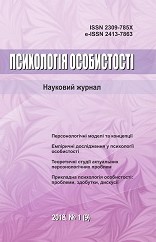ПСИХОЛОГІЧНИЙ МЕХАНІЗМ РОЗУМІННЯ ТЕКСТУ
DOI:
https://doi.org/10.15330/ps.9.1.76-82Ключові слова:
розуміння, розуміння тексту, механізм розуміння, значення, сенс, смисл., understanding, text understanding, understanding mechanism, meaning, senseАнотація
Стаття присвячено обґрунтуванню психологічного механізму розуміння тексту на основі узагальнення ґрунтовних сучасних розробок з указаної тематики. Зазначено, що питання про механізм розуміння тексту ще не отримало вичерпної відповіді. Найчастіше для пояснення психологічного механізму розуміння тексту використовують теорію гіпотез, теорію спільності значення, гіпотезу біологічної і функціональної схожості приписування значень, модель контекстуального семантичного обмеження слів, гіпотезу релевантності контексту, теорію дзеркальних нейронів та концепцію свідомого смислотворення. Проте використання методів узагальнення, аналізу та синтезу наукової літератури, елементів описового, корелятивного та концептуального аналізів дозволило висунути припущення, що психологічним механізмом розуміння тексту є взаємодія сенсу та значення.
Науковий аналіз зазначених понять привів до виокремлення їх диференційних ознак та дав підстави узгодити репрезентовані міркування у наступну гіпотезу: в результаті розуміння у свідомості суб’єкта виникають певні організовані уявлення щодо тексту – смисли, які згодом об’єктивуються у вторинний текст. Відтак психологічним механізмом розуміння є процес розкладання значень тексту на їх семантичні компоненти та утворення на цій основі власних вторинних смислів. Критерієм відбору прийнятних смислів може виступати контекст, що підтримує одні смисли та відкидає інші на основі спільності попереднього смислового змісту (Р. Краус, Н. В. Ігнатенко, В. В. Жовтянська, Г. В. Лосик), або ширше – спільний досвід, що формує такий спільний контекст (О. О. Залевська, М. Якобоні). Смисл виникає при зіткненні пропонованого текстом значення з наявними у свідомості реципієнта смислами за потреби їх узгодження; значення – загальне, об’єктивне, закріплене за словом, смисл – індивідуальний, суб’єктивний, не закріплений, а лише асоційований, тому він, як правило, ширший за значення.
The article is devoted to the substantiation of the psychological mechanism of text understanding on the basis of a generalization of the scrupulous modern scientific works. It is noted that the question of the text understanding mechanism has not yet received an exhaustive answer. Often, hypothesis theory, the theory of community significance, the hypothesis of biological and functional similarity of attribution of meanings, the model of contextual semantic restriction of words, the hypothesis of the relevance of the context, the theory of mirror neurons, and the concept of conscious thought-making are used to explain the psychological mechanism of text understanding. Meanwhile, results of analysis and synthesis of scientific literature, elements of descriptive, correlative and conceptual analysis let propose that the psychological mechanism of text understanding is the interaction of meaning and sense. The scientific analysis of these concepts led to the distinction of their differential features and gave reason to reconcile the representational arguments in the following hypothesis: sense is certain organized ideas about the text, it appears in the mind as a result of text understanding and represents into the secondary text. The psychological mechanism of understanding, respectively, is the process of decomposition of the text meanings into their semantic components and the formation of secondary sense on this basis. A criterion for selecting acceptable sense can be the context that supports some sense and rejects others based on the generality of the prior semantic content (R. Kraus, N. V. Ihnatenko, V. V. Zhovtyans’ka, H. V. Losyk), or more widely – a common experience, which forms such a common context (O. O.Zalevs’ka, M. Yakaboni). The contact the text proposed meaning with sense that existing in the recipient minds for their agreement led to appear the new secondary sense of the of the meanings; meaning is general, objective, fixed by word, sense is individual, subjective, not fixed, but only associate, therefore, it is usually wider than meaning.

